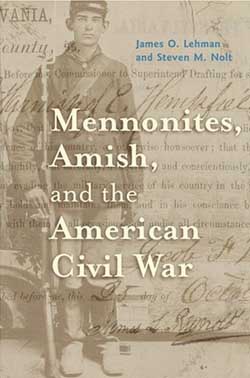 Last Tuesday marked the 150th anniversary of the start of the American Civil War, and historical organizations across the country are gearing up for a year-long commemoration of the conflict.
Last Tuesday marked the 150th anniversary of the start of the American Civil War, and historical organizations across the country are gearing up for a year-long commemoration of the conflict.
This auspicious occasion should also be a time of commemoration for the Brethren in Christ, for it was during the American Civil War that the small religious community first legally declared its nonresistant position.
Learn more about the American Civil War-era River Brethren and their nonresistant beliefs, after the jump.
Here’s the story, according to Carlton Wittlinger:
The [American] Civil War forced the United States Brethren to face the test of their nonresistant convictions when the Union Government drafted troops. Isaac Trump of Illinois and Jacob Ulery of Ohio were among the draftees; both registered as conscientious objectors. Others in Pennsylvania also did so . . . [1]
Among the Pennsylvania COs was Jacob S. Engel of Marietta. Like other Christian pacifists of his time, Engel planned to pay a commutation fee — a sum of money given by an individual to the government in lieu of performing military service — rather than serve in the Union forces. But then he learned that Congress was prepared to repeal the Commutation Clause, thus revoking pacifists’ ability to legally refuse military service. Concerned, he wrote a letter to U.S. Representative Thaddeus Stevens of Lancaster. The rest of Engel’s story is told by James O. Lehman and Steven M. Nolt in their book Mennonites, Amish, and the American Civil War:
Engel and his “nonresisting body” were deeply troubled to learn that the commutation fee might be repealed. Such a situation “would place us in a very difficult position as we cannot conscientiously furnish a substitute, or personly [sic] serve in military service,” Engel explained, suggesting that his church — like the Amish, but unlike most Mennonites — saw substitution as morally problematic. [In the Civil War era, conscientious objectors were permitted to send a substitute to serve in their stead.] He pleaded with Stevens, as the “representative of our County to present & advocate our Case & if necessary give us an advise if you please how to proceed in behalf of our Church.” [2]
In the end, the government passed a bill amenable to groups like the River Brethren:
The final version [of the conscription law] . . . recognized members of “religious denominations” whose “articles of faith and practice” prohibit bearing arms and whose “deportment has been uniformly consistent with such declaration.” Such people could pay the $300 commutation or accept assignment from the Secretary of War “to duty in the hospitals, or the care of freedmen [former slaves]. [3]
Thus, as historical societies and government-sponsored groups gear up to commemorate the War Between the States over the next year, the Brethren in Christ Church ought to commemorate its historic commitment to Christian nonviolence. There could be no better time to remember those members of our denomination who “also served” in ways consistent with Christ’s call to nonviolence.
Notes:
1. Wittlinger, Quest for Piety and Obedience (Nappanee, Ind.: Evangel Press, 1978), 106.
2. James O. Lehman and Steven Nolt, Mennonites, Amish, and the American Civil War (Baltimore, Md.: Johns Hopkins University Press, 2007), 154.
3. Ibid., 155.

I so appreciate the term, “they also served.” I know that during wars where all young men were drafted, alternate service also involved sacrifice; and conscientious objectors choosing this way did not receive salaries, college educations, housing loans, medical insurance, or future compensations. True, they did not offer what is often called, “the ultimate sacrifice,” but they did sacrifice a lot and served in many honorable ways. There is also the fact that from the Civil War on up through World War II, CO’s were often ridiculed and even physically threatened by a population whipped up into patriotic war hysteria. For most, the life of a CO was not just “the easy way out.”
It is important to recognize that the peace position needs to be taught in our churches during “times of peace” as well as during wars where the draft is an issue. Young people need to receive consistent teaching if they are to be prepared to make choices before conscription becomes an issue.
When our two sons approached high school graduation, they began to receive countless phone calls from military recruitment officers attempting to interest and even to lure them into signing up. My husband and I were grateful that both boys had adopted the peace positions of their parents, grandparents and great grandparents. However, I was impressed with the persistence and zeal of the recruiters. Church Youth Leaders should be no less interested in making sure that young people know how to consider and be prepared for these important decisions.
Great topic Devin, and great comments Karen, especially about training our children before
they reach 18. I was surprised in the difference between the BIC and some Mennonites about
whether to pay someone to take their place. I also wonder what the South did about the CO’s.